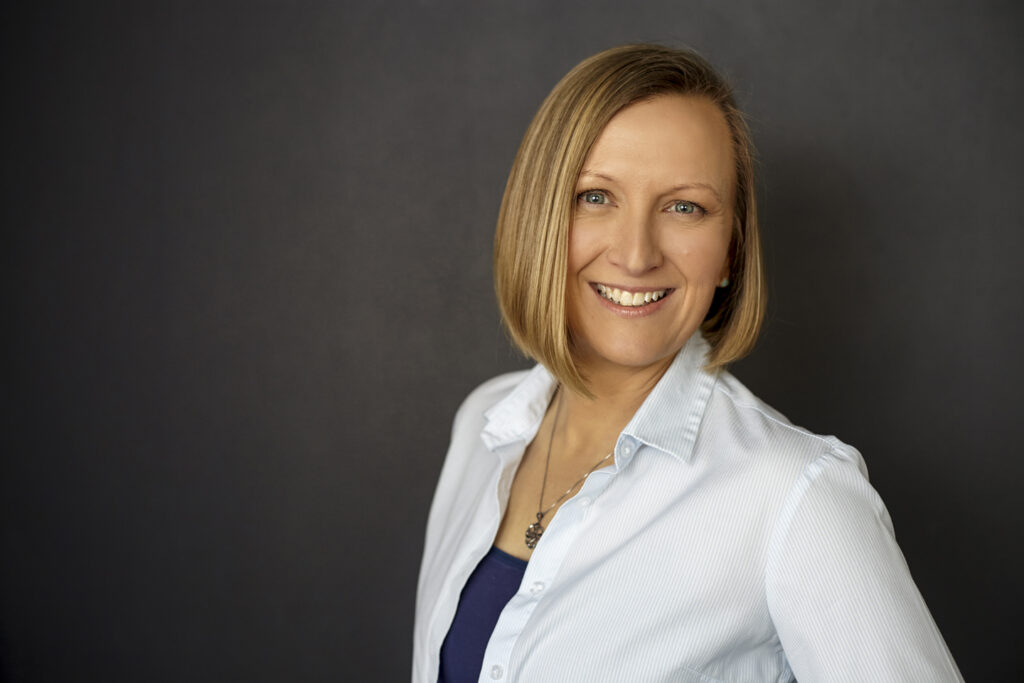How will you manage yourself and others through further change?
Change is one of the only constants in modern life, yet we’ve seen far more than any of us could have expected in such a short period of time. While there have been some real disruptions and innovations, in other areas, there has been much of an acceleration of trends or developments already in progress.

As further changes are undoubtedly inevitable, I was interested in learning how my inspirational leaders would manage themselves and others through this.
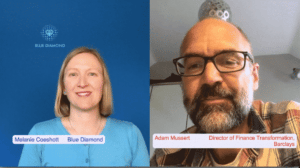
Adam Mussert – In terms of managing myself, because of where I live and how I live, I’m feeling the benefits of this, and that may sound a little selfish when so many people are suffering. For me, working flexibly and working from home is a real benefit, because I had a long-distance commute and it means I don’t have to stay away from home and I don’t have to spend as much time traveling. So, I’d like to think I could take some of that with me when all this lifts and shifts.
In terms of managing others, I think the key thing to be aware of is that everyone’s circumstances are different. So, I’ll try to listen, understand and observe – with colleagues around me and people that work for me, and to consider “what’s working for them and what doesn’t work for them?”. My experience could well be different from other people’s and there will be people who will be desperate to get back to the way of working they had before, and others may want to take the opportunity to work differently. So, a lot of it is about listening to people and understanding how they experience this but also just giving everyone space to reacclimatise.
I don’t know what it’ll be like going back to an office environment, none of us really do, having been away from it for a long time. So, it would be quite interesting to just give people space to the reacclimatise, myself included.
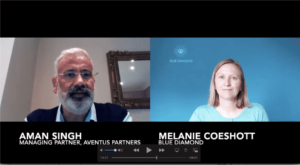
Aman Singh – Right at the outset, there was that concern. I was a little nervous, and in the first couple of weeks, I was quite nervous about how this was going to go, and how this was all going to pan out. No one really knew those early days.
Things have settled down, and I think the two things that counted for me more than anything else were, one would be to be flexible with the team members. This was something new for everyone. We were having to be very, very flexible with each other, and more importantly, communicate with each other and communicating with our clients. That was key.
The next thing was being compassionate. There were a couple of our team members who were struggling with IT, who were struggling with working from home due to their family environments – the accommodation they had or the facilities they had, and trying to make sure that we were there to support each other. Other than that, I think it’s being positive and looking forward to a better tomorrow and having that message going through the ranks.
These are unprecedented times. A number of our clients are facing the challenges that we are all hearing in the media, and being there for them with a positive mindset. Saying, “Yes, no problems. We can get through this as we’ve done in the past.”
Positivity, flexibility, and communication are the three things that I’ve been working on.
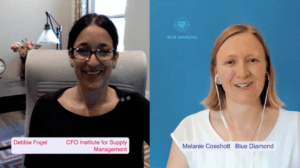
Debbie Fogel – You know one of the things that we’re doing is just trying to think.
First, the people in the organization and their wellness, both the ability to manage to work remotely, but also their whole person and not just how productive are they and what is their output, but really thinking about flexibility, allowing people more flexibility in terms of when they work and how they work.
Certainly, we have put in a lot more, purposeful informal communications. We have instituted a daily stand-up for the whole organization where, before we had more of like a quarterly All Hands meeting. I meet with my team by video and definitely spend some time just asking how people are doing and asking “What’s going well?” But also, it’s okay that things are not going well, allowing everyone to be honest about the challenges we’re facing, whether it’s managing child care at home, that we weren’t expecting, or interruptions to videos that we weren’t expecting. And there are lots of funny little videos online about that. But, I think that flexibility and understanding, and compassion have definitely been necessary and I think that’s a good thing. Granted, it should have always been there, but we focused on the office and productivity and work, maybe a little bit more than we should have. During this time frame, finding ways to connect and care about others is definitely something we’re doing.
I also think investments in innovation are important. I know many organizations are really struggling with just surviving during this timeframe, but to the extent that it’s possible, considering the way you work and the products you serve. We support customers who are thinking about investing for the long term, not just surviving short term and that’s a big challenge right now. All right there is that balance between short term and longer term, and that was always there, it just looks a little different right now.
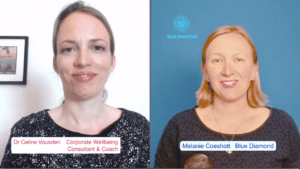
Dr. Celine Vousden – My work is often more consulting with people in leadership roles or through coaching or the stress and resilience work that I do. To consider it and the things that I’ve worked on with those individuals that I would apply to myself as well would be to really check in and connect with the team, with myself, and making that such a key element to understand what’s going on. What challenges are you facing? What do you need support with? How can I support you? Or simply, how are you today?
I suppose I’ve really fostered a stronger cohesive team and a greater understanding of each other in a way that perhaps wasn’t needed before because we all had our own lives. Now, we need that support even more because many of us are perhaps isolated. Particularly, if you are living alone, for example. Work has become even more of a lifeline and is a necessity for some, those strong, cohesive bonds. I also think that removing some of the hierarchies because you see somebody on a Zoom call who has mashed up banana on their shoulder or the child comes running in. I think that’s great actually because you see that human aspect. I think it’s going to be really hard to go back from that and that will only be a positive thing.
I guess I will lead and manage myself by being open, honest, accepting, and self-compassion, and realizing some things aren’t going as well as I’d hoped. That’s okay. Then understanding what I need in order to move forward, is how I would approach it for myself and exactly the same for my team. Some of the ways that we do this and then through building closer social connections with the team, understanding, and almost creating a family environment. I think that is a potentially real shift that will have come out from the situation if embraced.
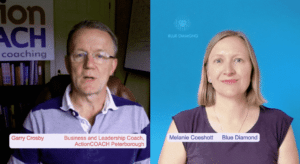
Garry Crosby – So, for me, I’ve been trying over the last eight or nine weeks now to say to clients “Yes, you are in a very difficult situation”, for most people and businesses being profoundly affected by this, “but the right thing to do here is to look for opportunities and then lead your staff and your team towards those opportunities” because it’s no surprise that some businesses have found different ways of doing things. They’ve found different products or different services that they can offer. And the good leaders, my clients amongst them definitely, will be urging their teams to look for those additional opportunities. So, we might see businesses I think coming out of this in a slightly different shape, with a slightly different feeling to them, offering their services in a different way. That’s going to be really important in the next few weeks.
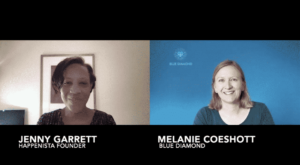
Jenny Garrett – I think boundaries are key right now. With people who are lucky enough to be able to work from home, it’s a bit of a blessing and a curse because you can wake up, be in your pyjamas, and go straight to your computer. If nothing’s stopping you, if you live alone, for example, or you don’t have too many other commitments, you could work into the night. That boundary of closing an office door or walking out of a building and going into another one, you don’t have. Some people don’t have an office room, they might be working from a kitchen table, whatever it is. I think those boundaries around how much work you do and how you work, you have to set them for yourself.
I think this is really important right now because we could quite easily become really exhausted, really burnt out through the work we do.
Actually, what is the work-life balance you desire? How do you want to work? How do you set those for yourself maybe when you’ve been used to your organization setting it for you? How do you manage all of that? It is within your power. I think it’s very important for you to recognize actually “I can turn off my computer at whatever clock it is and walk away from it, and I have permission to do that”.
I think boundaries are key. I think getting some time away from your computer. Actually putting in your breaks on a regular basis and getting some exercise and some fresh air and looking away from a screen is really important, as maybe having a bit of a digital detox. Maybe saying one weekend I’m not going to be on social media or maybe I’m going to not watch TV even, just actually give my eyes a rest. I see that as a key thing. These things are about boundaries, about well-being. Those things are really key right now, I think.

Johan Gabriels – If I look at my team, I have my morning team touchpoints, to make sure that everybody is awake and is kind of dressed properly because I think this is important when working from home. It’s not your office, it’s actually the place you are sleeping, so you need a difference between when you work and when you stop working.
So, I have some kind of ritual a way to have a call with everybody in the morning and again with everybody in the late afternoon, to support this delineation.
And then I have my regular 1:1s with individuals or teams.
They also know they can contact me if they need me for anything urgent. So, all these things are in place.
We also do some pulse checks and surveys to learn how we can improve. We make sure that they all have the equipment they need at home, to be as productive as possible.
Working in a fintech we can actually measure a lot of things generally, and it’s based on these analytics and these KPIs that we’re trying to lead them through this period.
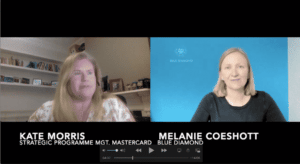
Kate Morris – I’m the poster child of what not to do sitting at home when it comes to ergonomics.
As I’ve said, I’ve been working from home for quite some time now. I do my best work in my pyjamas at the kitchen table. I did have an ergonomic chair, but it wasn’t the right setting. Being very interested and talking into the computer, I was not sitting correctly, and then actually stuffed my shoulder to the point of being in absolute agony trying to get a water bottle. Lots of weeks of physio and getting it sorted have fixed it, but also making sure I’ve got the right desk, making sure I’ve got my computer set up correctly.
I’ve actually put something on my phone now. It just beeps at me every 20 minutes. It’s just a little beep. It’s not a huge alarm, but what it does is trigger me to remember, check my posture, and check what I’m doing. That makes it easy. Also, that 20 minutes is the nudge to move or “Get up and do something.” I was so used to just sitting there focused, and it was 4 pm and I still hadn’t moved to have lunch, and then say, “Okay, I’ve got to go and get my daughter,” and then my second day, my second shift would start.
I wasn’t looking after myself.
Making sure that I’m the best I can be – starting by sitting right – means then I can do my job well. Because I’ve hurt myself, I’m now actively telling people to make sure that they are moving around and stretching and doing those things.
The other thing is emotional check-in. Not everybody is going to have the ability to use video conferencing depending on the bandwidth within their own company or where they are in the world.
Just asking the question, and I think a lot of people that you’ve spoken to have talked about how they miss that ability to talk to people and see the emotional reaction when they’re talking. We have to find ways around that because we’re not always going to get that. Even after the pandemic finishes, you’re still going to have people that you need to talk to across the world who may not have it.
You need to change the way that you’re interacting with people. You can ask the question of how you’re feeling. That emotional check-in before you start a conversation might change how you bring up certain things and give the person the ability to be able to just “Okay, I’m having a crap day”. Then maybe we need to talk about things in a different way or maybe at another time. I think that really helps me when I’m speaking with people, giving them the air space to just be able to do it.
I’m a big, early adopter of lots of techs.
I love gadgets, I love being able to try new technology. One thing that I’ve always loved is having the ability to communicate in real time with people. You miss that when you’re not sitting in a room. I don’t have a whiteboard, and I can’t scribble on it, but I want to be able to share a picture. Maybe it’s not a word, I need to be able to draw something to explain what I’m trying to say. There are tools available that you can use, that will give you the ability to connect with people in real time.
That’s really important because it then gives you another communication avenue, it doesn’t just have to be typing. Because it’s real-time, it makes you feel like you’re almost here in the room. It’s a little bit of something that we’ve been able to use, and it works really well.
In the communication part, you have to re-emphasize, give directions, and check in. Did you actually hear what I said? This idea of tomatoes–tomatoes, you really got to make sure that you’re taking the time to make sure the message sticks.
Always checking in, whether that’s by quickly writing the notes and putting them up in their collaboration tool so people can see they can talk to it, getting them to play it back.
These are all things that might take a little bit longer when you’re talking to people. You have to keep that in mind. It makes the difference because what you’re ensuring is all the other cues that you need to be able to get from people because you’re not sitting in the same room. You’re not getting the normal social cues from looking at them.
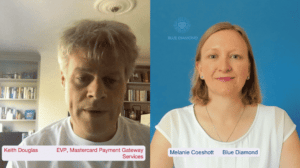
Keith Douglas – How I manage myself has already changed, certainly adapted to the environment we’re in. Going back to what I said earlier about continuing to push empowerment and giving that feeling of trust to the team.
But for me, I previously spent a lot of my time on planes visiting team members and clients in different countries and visiting partners so that we could get things done. That was an important part of my role. But, not being able to travel, has made me sit back and think about how I use my time, and certainly in a world going forward where we’re not as restricted as we are now, how I best optimize my time.
I’ve had a lot of time to reflect, not only on my ability and style as a leader but actually to think more deeply and more strategically about this business than I have in the past, even when jumping from a plane into an office, so that’s one aspect. Getting that balance right between thinking and doing. I’ve certainly got more balance in my thinking now, quite a balance towards the thinking, and for me as a leader, that’s an important part of my role.
The other element I certainly appreciate in this environment is in respect of me as the leader of the team, but also personally, is making my weekends feel different than my week.
Obviously, I’m sitting in the same place, Monday through Sunday, albeit I spend a lot more time Monday to Friday in this home office and less on the weekend, but I make sure I spend time with others. I make sure I talk, especially with my family here, but also make sure that I switch off, so, therefore, my team can also switch off.
Now, I don’t tell my team what to do, but I know my team responds to a lot of my emails. Over these last ten weeks, on a handful of occasions, I’ve sent an email that’s basically critical because our business is an operating platform, but you know, being more respectful of this.
So, there are two key ways: get the right balance between thinking and doing and make sure that I don’t drive behaviors of my team that are unhelpful or inconsiderate.
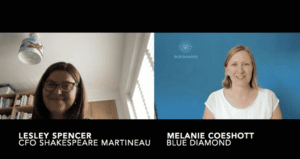
Lesley Spencer – One of the things that we have played around with is trying to get the communication right. And when I say right, there’s the right or wrong way to do it, it’s really dependent on the individuals that you work with.
One thing that I’ve noticed is that I no longer feel comfortable just having a phone call: I need to be able to see the person I’m talking to now. In the old world, I would have just called people, and that would have been absolutely fine. I appreciate now just how much of the communication I do is that I rely on seeing the other person I’m speaking to. I can pick up so much just from being able to see their face, their mannerisms, and how they behave and it helps me to understand the person I’m dealing with so much more. I’ve not had a phone call now since I don’t know when. Everything is Zoom, WhatsApp, or Facetime, so that I can see, and get that feel for the person, I’m talking to.
Another thing that my finance team now do, and we have just over fifty people on our team, is a weekly coffee catch-up, where actually we will just join on the screen. We can talk about anything and nothing, but it’s that sense of community and being able to see everybody and knowing that I’m interested in them. I’m interested in what they’re doing and how they are. And, again I can see them.
So, for me, a lot of it is still about that connection, that connectivity, but also making sure that people can see the bigger picture. I think in recent weeks we’ve been so focused in the short term, on the immediacy of keeping the lights on and making sure we were still able to operate on a day-to-day basis. But the key for me really is making sure that we don’t lose sight of the longer-term plan.
We’ve still got to plan, but actually, the way that we work becomes much more agile. Within finance, normally we’d be in the middle of the budgeting process. We’re not doing that now, there’s no point in having a budget that we set for twelve months’ time because it would be like looking in a crystal ball. So instead, we’re very much understanding the drivers of the business and having much more frequent lead and lag measures, not just looking at revenue, but at all of the indicators, and making sure that we communicate this with people and treating our team leaders and our directors as business people.
We want to run the business for the longer term and not just for short-term profits or short-term impacts. I think that’s quite a change in how we look at our business, which I think makes it much more exciting when it feels that they have some control over their destiny, they want to grow and we want to support them with their plans. So, I think it’s very different from the traditional partnership model and so I’m trying to drive all of that from my room at home, as well.
So, change on all sorts of levels, but very much how I think we’re going to operate going forward.

Thanks for reading. Check out the other interviews in the Post Lockdown Leadership Review series.
Check out other Blue Diamond articles to help you take control of your work and life.

